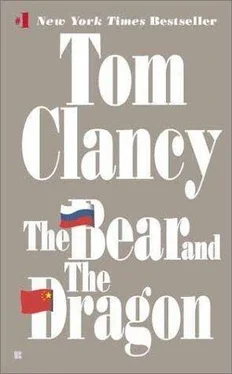Tom Clancy - The Bear and the Dragon
Здесь есть возможность читать онлайн «Tom Clancy - The Bear and the Dragon» весь текст электронной книги совершенно бесплатно (целиком полную версию без сокращений). В некоторых случаях можно слушать аудио, скачать через торрент в формате fb2 и присутствует краткое содержание. Год выпуска: 2001, ISBN: 2001, Жанр: Триллер, на английском языке. Описание произведения, (предисловие) а так же отзывы посетителей доступны на портале библиотеки ЛибКат.
- Название:The Bear and the Dragon
- Автор:
- Жанр:
- Год:2001
- ISBN:780425180969
- Рейтинг книги:3 / 5. Голосов: 1
-
Избранное:Добавить в избранное
- Отзывы:
-
Ваша оценка:
- 60
- 1
- 2
- 3
- 4
- 5
The Bear and the Dragon: краткое содержание, описание и аннотация
Предлагаем к чтению аннотацию, описание, краткое содержание или предисловие (зависит от того, что написал сам автор книги «The Bear and the Dragon»). Если вы не нашли необходимую информацию о книге — напишите в комментариях, мы постараемся отыскать её.
The Bear and the Dragon — читать онлайн бесплатно полную книгу (весь текст) целиком
Ниже представлен текст книги, разбитый по страницам. Система сохранения места последней прочитанной страницы, позволяет с удобством читать онлайн бесплатно книгу «The Bear and the Dragon», без необходимости каждый раз заново искать на чём Вы остановились. Поставьте закладку, и сможете в любой момент перейти на страницу, на которой закончили чтение.
Интервал:
Закладка:
But what they had found had staggered them. From Kazachye on the River Yana all the way to Kolymskaya on the Kolyma was an oil field to rival the Persian Gulf. The thumper trucks and portable computer-carrying seismic-survey vehicles-had shown a progression of perfect underground dome formations in stunning abundance, some of them barely two thousand feet down, mere tens of vertical yards from the permafrost, and drilling through that would be about as hard as slicing a wedding cake with a cavalryman’s saber. The scope of the field could not be ascertained without drilling test wells-over a hundred such wells, the chief American engineer thought, just from the sheer scope of the field-but no one had ever seen as promising or as vast a natural deposit of petroleum during his professional lifetime. The issues of exploitation would not be small ones, of course. Except for Antarctica itself, there was no place on the planet with a less attractive climate. Getting the production gear in here would take years of multistage investment, building airfields, probably building ports for the cargo ships that could alone deliver the heavy equipment-and then only in the brief summer months-needed to construct the pipeline which would be needed to get the oil out to market. Probably through Vladivostok, the Americans thought. The Russians could sell it from there, and supertankers, more precisely called VLCCs or ULCCs-for Very Large to Ultra-Large Crude Carriers-would move it out across the Pacific, maybe to Japan, maybe to America or elsewhere, wherever oil was needed, which was just about everywhere. From those users would come hard currency. It would take many more years until Russia could build the wherewithal needed for its own industries and consumers to use the oil, but, as such things happened, the cash generated from selling the Siberian crude could then be flipped and used to purchase oil from other sources, which would be much more easily transported to Russian ports and thence into existing Russian pipelines. The cash difference of selling and buying, as opposed to building a monstrous and monstrously expensive pipeline, was negligible in any case, and such decisions were usually made for political rather than economic reasons.
At precisely the same time, and only six hundred miles, or nine hundred sixty or so kilometers, away, another geology team was in the eastern extreme of the Sayan mountain range. Some of the semi-nomadic tribes in the area, who had made their living for centuries by herding reindeer, had brought into a government office some shiny yellow rocks. Few people in the world have been unaware of what such rocks mean, at least for the preceding thirty centuries, and a survey team had been dispatched from Moscow State University, still the nation’s most prestigious school. They had been able to fly in, since their equipment was far lighter, and the last few hundred kilometers had been done on horseback, a wonderful anachronism for the survey team of academics, who were far more used to riding Moscow’s fine subway system.
The first thing they’d found was an eighty-ish man living alone with his herd and a rifle to fend off wolves. This citizen had lived alone since the death of his wife, twenty years before, quite forgotten by the changing governments of his country, known to exist only by a few shopkeepers in a dreary village thirty kilometers to the south, and his mental state reflected his long-term isolation. He managed to shoot three or four wolves every year, and he kept the pelts as any hunter/herdsman might, but with a difference. First he took the pelts and, weighting them down with stones, set them in the small river that ran near his hut.
In Western literature there is the well-known story of Jason and the Argonauts, and their heroic quest for the Golden Fleece. It was not known until recently that the legend of the artifact sought was quite real: The tribesmen of Asia Minor had set the skins of sheep in their streams to catch the gold dust being washed down from deposits higher up, changing the pale wool fibers into something almost magical in appearance.
It was no different here. The wolf pelts the geologists found hanging inside the old soldier’s hut looked on first inspection to be sculptures by Renaissance masters, or even artisans of the Pharaohs of dynastic Egypt, they were so evenly coated, and then the explorers found that each pelt weighed a good sixty kilograms, and there were thirty-four of them! Sitting down with him over the necessary bottle of fine vodka, they learned that his name was Pavel Petrovich Gogol, that he’d fought against the Fascisti in the Great Patriotic War as a sniper, and, remarkably, was twice a Hero of the Soviet Union for his marksmanship, mainly in the battles around Kiev and Warsaw. A somewhat grateful nation had allowed him to return to his ancestral lands-he was, it turned out, descended from the entrepreneurial Russians who’d come to Siberia in the early nineteenth century-where he’d been forgotten by the bureaucrats who never really wondered much where the reindeer meat eaten by the locals came from, or who might be cashing his pension checks to buy ammunition for his old bolt-action rifle. Pavel Petrovich knew the value of the gold he found, but he’d never spent any of it, as he found his solitary life quite satisfactory. The gold deposit a few kilometers upstream from the place where the wolves went for their last swim-as Pavel Petrovich described it with a twinkle in the eye and a snort of vodka-turned out to be noteworthy, perhaps as much as the South African strike of the mid-nineteenth century, and that had turned into the richest gold mine in the history of the world. The local gold had not been discovered for several reasons, mainly relating to the dreadful Siberian climate, which had, first, prevented a detailed exploratory survey, and, second, covered the local streams with ice so much of the time that the gold dust in the streambeds had never been noticed.
Both the oil and rock survey teams had traveled into the field with satellite phones, the more quickly to report what they found. This both teams did, coincidentally on the same day.
The Iridium satellite-communications system they used was a huge breakthrough in global communications. With an easily portable instrument, one could communicate with the low-altitude constellation of dedicated communications satellites which cross-linked their signals at the speed of light (which was almost instantaneous, but not quite) to conventional communications birds, and from there to the ground, which was where most people were most of the time.
The Iridium system was designed to speed communications worldwide. It was not, however, designed to be a secure system. There were ways to do that, but they all required the individual users to make their security arrangements. It was now theoretically possible to get commercially available 128-bit encryption systems, and these were extremely difficult to break even by the most sophisticated of nation-states and their black services … or so the salesmen said. But the remarkable thing was that few people bothered. Their laziness made life a lot easier for the National Security Agency, located between Baltimore and Washington at Fort Meade, Maryland. There, a computer system called ECHELON was programmed to listen in on every conversation that crossed the ether, and to lock in on certain codewords. Most of those words were nouns with national-security implications, but since the end of the Cold War, NSA and other agencies had paid more attention to economic matters, and so some of the new words were “oil,” “deposit,” “crude,” “mine,” “gold,” and others, all in thirty-eight languages. When such a word crossed ECHELON’S electronic ear, the continuing conversation was recorded onto electronic media and transcribed and, where necessary, translated-all by computer. It was by no means a perfect system, and the nuances of language were still difficult for a computer program to unravel-not to mention the tendency of many people to mutter into the phone-but where a goof occurred, the original conversation would be reviewed by a linguist, of which the National Security Agency employed quite a few.
Читать дальшеИнтервал:
Закладка:
Похожие книги на «The Bear and the Dragon»
Представляем Вашему вниманию похожие книги на «The Bear and the Dragon» списком для выбора. Мы отобрали схожую по названию и смыслу литературу в надежде предоставить читателям больше вариантов отыскать новые, интересные, ещё непрочитанные произведения.
Обсуждение, отзывы о книге «The Bear and the Dragon» и просто собственные мнения читателей. Оставьте ваши комментарии, напишите, что Вы думаете о произведении, его смысле или главных героях. Укажите что конкретно понравилось, а что нет, и почему Вы так считаете.






![Александр Ирвин - Tom Clancy’s The Division 2. Фальшивый рассвет [litres]](/books/417744/aleksandr-irvin-tom-clancy-s-the-division-2-falsh-thumb.webp)




